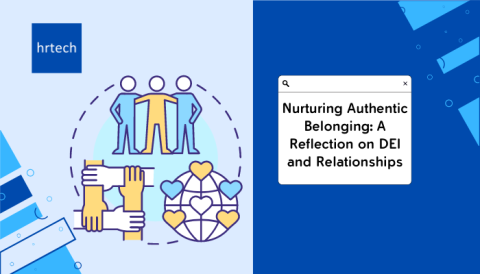“The big idea here is that ‘People can’t BE what they can’t SEE.’ Thus, it becomes paramount for leaders to actively cultivate environments within workplaces where every individual feels acknowledged, valued, and respected and see what’s possible.”
by Charlene
Today, organizations and communities increasingly acknowledge the pivotal role of Diversity, Equity, Inclusion, and Belonging (DEIB) in driving success. No longer does a one-size-fits-all approach suffice. Navigating the complexities of a diverse workforce and global marketplace now demands empathy and finesse, especially concerning human connections within the organization. Despite numerous initiatives aimed at fostering DEIB, their ultimate success hinges on the people within the organization and community, with a focus on tangible evidence of organizational changes.

As a Professional Coach & Consultant specializing in corporate & leadership transformation, I’ve witnessed firsthand the profound impact of DEIB commitment on individuals, teams, and entire organizations and communities. Let’s delve deeper into the human dynamics driving the success of DEIB initiatives and explore how to create transformative impacts. Over my two-decade career, I’ve observed many initiatives implemented in organizations, often causing employee fatigue due to a lack of human connections. These disconnected initiatives, often conveyed through impersonal system messages, failed to foster genuine connections among employees, leading to disillusionment with DEIB projects.
DEIB initiatives surpass superficial checkboxes; they entail embracing intersectionality and acknowledging the multifaceted nature of individual identity. Among the foremost challenges confronting organizations is workplace pressure, manifesting in daunting deadlines, heavy workloads, and fierce competition. This pressure not only detrimentally affects employee well-being but also undermines the efficacy of DEIB endeavors. Employees may find themselves overwhelmed, leading to burnout and disengagement, thereby hindering progress towards diversity and inclusion objectives.
Moreover, leadership uncertainties compound these challenges. Leaders may lack clarity on how to effectively champion DEIB initiatives or feel inadequately equipped to address resistance within the organization. This uncertainty stems from a failure to grasp the root causes of inequality and a reluctance to confront uncomfortable truths regarding existing power structures and biases.
Despite the global momentum towards fostering inclusive workplaces, certain communities continue to grapple with divisive debates surrounding equality, further exacerbating workplace pressures. Amidst these complexities, leaders may struggle to navigate the intricacies of DEIB initiatives, despite acknowledging their importance to the business. Addressing these challenges necessitates organizations to first acknowledge the painful root causes underlying workplace pressure and leadership uncertainties. This demands a willingness to confront systemic issues such as unconscious bias, unequal power dynamics, and institutionalized discrimination.
Research indicates that organizations fostering a high sense of belonging witness a significant increase in job performance, a reduction in sick days, and a drop in turnover risk. Additionally, diverse teams are more likely to achieve financial returns above the industry mean. By integrating belonging into existing DEI initiatives, organizations not only enhance financial returns but also reduce hiring costs.
Plenty of strategies exist for DEIB implementation, with a recent focus on belonging. Belonging involves ensuring that individuals from diverse backgrounds feel heard, seen, and recognized for their contributions, as human beings have a legitimate need for acceptance in social groups like an organization and community. Organizational success depends on individuals feeling valued and empowered to connect and contribute fully, necessitating a cultural shift towards embracing diversity, equity, inclusion, and belonging.
In a recent program I led in a foreign country where English is not the first language, I encountered a formidable language barrier. With the local language being unfamiliar territory for me, I relied heavily on a translator to bridge the linguistic gap during the sessions’ introductions and conclusions. Yet, despite our best efforts, the essence of the program often seemed lost in translation, leaving me grappling with the challenge of conveying its true intent. Faced with this hurdle, I decided to pivot my approach on the second day. Rather than racing through the content with the translator, I opted for a more deliberate pace, allowing each sentence to be translated meticulously, line by line. While this adjustment meant sacrificing some breadth of material coverage, it ensured that the core objectives of the program were articulated clearly and effectively.
Surprisingly, amidst the linguistic diversity, a sense of inclusivity blossomed within the session. Following the program, an English-speaking participant approached me, praising the inclusive atmosphere fostered despite the linguistic diversity. This experience underscored the notion that regardless of our backgrounds or the languages we speak, we all possess the innate ability to dream and learn, irrespective of age or origin—an alignment perfectly in tune with the program’s objectives.
This crystallized for me the essence of Diversity, Equity, Inclusion, and Belonging (DEIB), revealing its true power in forging human connections and understanding across barriers. The big idea here is that “People can’t BE what they can’t SEE.”. Thus, it becomes paramount for leaders to actively cultivate environments within workplaces where every individual feels acknowledged, valued, and respected and see what’s possible. This not only enhances productivity but also ignites a sense of empowerment and innovation, encapsulating the core ethos of DEIB.
In light of this, it is imperative to introduce the foundational ABCs of nurturing human connections within organizations to propel DEIB systemic initiatives forward:
For All Individuals:
This is the fundamental principle that every individual’s leadership within an organization or community must embrace to ensure the success of all systemic DEIB initiatives:
- Awareness: Encourages mindfulness and self-awareness, being present in the moment and attentive to one’s thoughts, feelings, and surroundings.
- Beholding: Promotes the idea of observing and truly seeing others, acknowledging their presence, experiences, and perspectives with empathy and understanding.
- Connecting: Emphasizes the importance of genuine connections and relationships with others, fostering meaningful interactions and communication built on mutual respect, trust, and empathy.
For Team Leaders:
Regardless of whether you oversee a dedicated team or collaborate with others on a project team, you are effectively leading a group of individuals. With the aforementioned ABC qualities and additional strategies to uphold DEIB success in your team:
- Assuming Positive Intent: Embrace the concept of assuming positive intent, where you trust that your colleagues are working with good intentions. This mindset shift can revolutionize your perception of work, work life, and your colleagues, fostering a more positive and collaborative environment.
- Building Trust Quickly: Foster trust rapidly by engaging with your team members with empathy and enthusiasm. Building genuine connections and demonstrating sincere interest in their well-being can strengthen trust and rapport within the team.
- Clarity of Roles: Ensure clarity of roles within the organization, where individuals have a clear understanding of their responsibilities, duties, and expectations. Role clarity is vital for enhancing performance, communication, and collaboration, ultimately leading to higher productivity and job satisfaction while reducing ambiguity and conflict.
For Senior Management Team:
As the primary guardians or champions of certain values, vision, or initiatives within the organization and community, you hold the responsibility for preserving and advancing key aspects of the company’s identity or mission, encompassing all the qualities mentioned above, and the overarching capacity required:
- Advocate for DEIB Initiatives: Senior leadership should actively promote and champion these initiatives, setting the tone for the entire organization. Embracing vulnerability in leadership by taking ownership fosters a culture of learning and growth, where others feel safe to fail and evolve alongside you. Leading with lived experiences of DEIB instils authenticity in advocating for DEIB as organizational leaders.
- Building in system for rewiring process: Allow for the rewiring of the cultural system to facilitate connections and behavioral changes among people. Allow for opportunities to reconfigure the cultural system to eliminate barriers and foster connections, thereby reshaping people’s behavior in how they connect within the organization.
- Cultivating Diverse Leadership: Create opportunities for meaningful contributions rather than adhering strictly to planning. Encourage discussions, collaboration, and innovative problem-solving approaches. Being open to opportunities as they arise connects people with the mission of the organization and community.
Today, DEIB initiatives aim to create inclusive and supportive work environments, prioritizing inclusivity to boost employee happiness, loyalty, retention, and talent attraction. In conclusion, Diversity, Equity, Inclusion, and Belonging isn’t just shining right —it’s the smart thing to do. By embracing human connection, intersectionality, adopting inclusive leadership practices, overcoming implicit bias, and recognizing the transformative impact of DEIB efforts, organizations can create a more inclusive, barrier-less, and prosperous future for all.

Author’s bio:
Meet Charlene, an accomplished coaching professional with a prestigious ICF-ACC credential and certification as a TRE® Provider. Specializing in coaching corporate leaders, she helps them excel in both their professional and personal lives. Through her Lead-Life coaching program, Charlene empowers clients to achieve well-deserved career advancements and attain time freedom, guiding them from burnout challenges to life clarity. Additionally, she provides tailored training programs to assist organizations in cultivating high-performing teams, emphasizing workplace collaboration, team dynamics, effective presentations, seamless communication, and overall employee well-being.
Also read: Dispelling 3 Common Myths About DE&I in Asia’s Diverse Landscape




